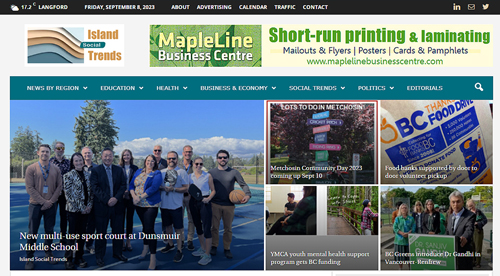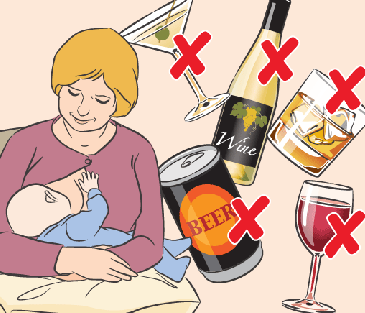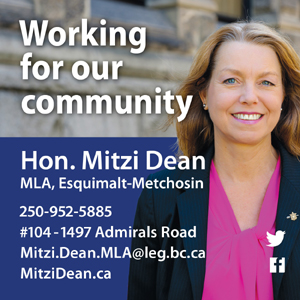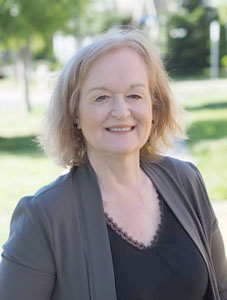Saturday September 9, 2023 | VICTORIA, BC [Updated September 11, 2023]
by Mary P Brooke, B.Sc. | Island Social Trends
It’s been known for well over 50 years that alcohol consumption during pregnancy can and often does result in damage to the fetus, the impacts of which are lifelong.
Damage to the unborn child due to alcohol exposure is known to results in physical problems and problems with behavior and learning in children and into their adult lives. Alcohol interferes with the delivery of oxygen and optimal nutrition to the developing baby resulting in harm to the development of tissues and organs and permanent brain damage.
Since the 1970s, nutrition educators have been recommending zero alcohol consumption during pregnancy, and the medical profession caught up soon after that.
Plain and simple from The Mayo Clinic: “There is no amount of alcohol that’s known to be safe to consume during pregnancy. If you drink during pregnancy, you place your baby at risk of fetal alcohol syndrome.”
Given all that, it’s disappointing that Fetal Alcohol Spectrum Disorder (FASD) continues to present itself in the BC population.
The nearly unquestioned social acceptance of alcohol consumption in our society needs a serious rethink. Where there are socioeconomic factors that play into the choice to drink alcohol, those are areas where government can make the biggest difference.
Role of midwives:
Midwives have an up-close opportunity to counsel their clients about good health during pregnancy.
“As evidence-based primary care providers, registered midwives counsel their clients about alcohol consumption during pregnancy,” says the Midwives Association of BC (MABC).
“Midwives’ relational care model, fotered by continuity of care, allows midwives to have longer appointments with their clients where informed choice discussion are enabled,” says an MABC spokesperson.
Physical and behavioural impacts of alcohol during pregnancy:
(Source: The Mayo Clinic)
FASD physical defects include:
- Distinctive facial features, including small eyes, an exceptionally thin upper lip, a short, upturned nose, and a smooth skin surface between the nose and upper lip
- Deformities of joints, limbs and fingers
- Slow physical growth before and after birth
- Vision difficulties or hearing problems
- Small head circumference and brain size
- Heart defects and problems with kidneys and bones
FASD brain and nervous system problems:
Problems with the brain and central nervous system from may include:
- Poor coordination or balance
- Intellectual disability, learning disorders and delayed development
- Poor memory
- Trouble with attention and with processing information
- Difficulty with reasoning and problem-solving
- Difficulty identifying consequences of choices
- Poor judgment skills
- Jitteriness or hyperactivity
- Rapidly changing moods
Social and behavioural issues:
Problems in functioning, coping and interacting with others may include:
- Difficulty in school
- Trouble getting along with others
- Poor social skills
- Trouble adapting to change or switching from one task to another
- Problems with behavior and impulse control
- Poor concept of time
- Problems staying on task
- Difficulty planning or working toward a goal
BC government support:
The Ministry of Children and Family Development is supporting prevention and active supports, this year with a $250,000 grant to the Inspire Kids – FASD Support Society of BC.
Here is a statement from Mitzi Dean, Minister of Children and Family Development, issued today September 9, 2023 during Fetal Alcohol Spectrum Disorder Prevention and Support Month:
Statement from Mitzi Dean, Minister of Children and Family Development:
“People living with disabilities are faced with unique challenges every day, especially those whose disabilities are surrounded by stigma or shame. Fetal alcohol spectrum disorder (FASD) is a lifelong neurodevelopmental disability that approximately 40,000 people in B.C. live with each day. Sadly, the unique experiences of those living with FASD often get overshadowed by misunderstanding and inadequate information, making the lives of those navigating this journey even more difficult.
“September is FASD Prevention and Support Month. This month serves as a dedicated period to raise awareness, foster understanding surrounding the challenges faced by the people and families affected by FASD, and supports prevention approaches. It is also a time to recognize and celebrate the strengths that these individuals bring to our communities.
“The theme for this year’s FASD Prevention and Support Month – Uniting our Strengths: Finding Solutions Together – resonates deeply with me and highlights the need for a collective effort to understand, support and uplift children and families affected by FASD.
“I am deeply moved by the reality that children with support needs, particularly those affected by FASD, have often been underserved. I am delighted to announce a $250,000 grant for the Inspire Kids – FASD Support Society of BC, an organization dedicated to supporting those affected by FASD. Inspire Kids’ work with families of children living with FASD aligns with our vision to create an environment where every child can thrive and reach their full potential. This funding will help them extend their reach and continue to provide invaluable support to families of children with FASD in B.C.
“My ministry is committed to continuing to provide responsive support to families and children with support needs. As a powerful reminder of our commitment to stand beside those affected by FASD and raise awareness for FASD Prevention and Support Day, B.C.’s Parliament Buildings were lit with red on Sept. 1.
“As we journey through FASD month and mark FASD day, let us remember that FASD affects each one of us. FASD is not just a medical term, it is a journey that uniquely affects each individual, shaping their world in complex ways.
“As minister of children and family development, I am committed to ensuring every child and family has access to the supports they need to live a full, happy and healthy life. We will continue taking action to increase access to underserved children and youth with support needs alongside our efforts to spread awareness, share knowledge and support those whose lives are touched by FASD.”
===== EXTERNAL LINKS:
- Fetal Alcohol Syndrome (The Mayo Clinic)
- Canada FASD Research Network
- FASD Disorder (Health Canada – 2022)

===== ABOUT THE WRITER:
Mary P Brooke is the editor and publisher of Island Social Trends which publishes daily at IslandSocialTrends.ca.
She holds a B.Sc. in Foods and Nutrition (1981) as well as a university Public Relations Certificate (1985).
Mary P Brooke currently delivers presentations in the community about Urban Food Resilience and food security issues.








